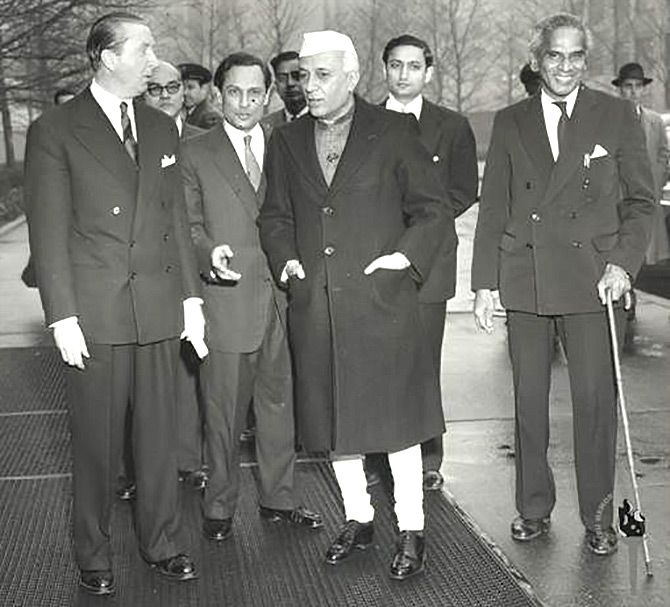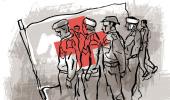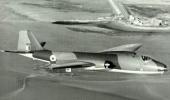'Rightly or wrongly, 1962 got ascribed to Krishna Menon and him alone. That's unfair.'
'Certainly, he was one of the guilty men, but he was not the only guilty man. Mistakes were made all around.'

Was V K Krishna Menon, then defence minister, the main reason why India lost the 1962 battle with China?
"History has vindicated Krishna Menon on the negotiated settlement with China. In the last 16 years, we have been negotiating. The biggest tribute to him is today India and China are negotiating... I would say the best tribute to Krishna Menon came from Vajpayee by him going to China in 2003," Jairam Ramesh, author of A Chequered Brilliance, The Many Lives of V K Krishna Menon, tells Rediff.com's Shobha Warrier in the concluding part of an eloquent interview.
- Part 1 of the Interview: 'People hated him. People loved him. But people could never ignore him'
What made Nehru and Krishna Menon so close? The same wavelength, British upbringing?
Nehru saw Krishna Menon's brilliance. Nehru saw that he was held in great intellectual esteem by people Nehru respected like (Harold) Laski, Stafford Cripps, Clement Atlee.
Then they also had a common theosophical background. Krishna Menon's first mentor was Annie Besant. Nehru was a great admirer of Annie Besant.
Krishna Menon was the literary agent for Nehru. He gave Nehru wider exposure and wider popularity, particularly in England and in the (European) continent.
Both of them saw India's freedom movement in the context of the global struggle against imperialism whether it was Spain, China or Ethiopia.
Krishna Menon was an extension of Nehru in many ways, in thought processes, in intellect. Nehru felt that everybody else in the Congress party was a UP leader or a Bengal leader or a Bihar leader. But Krishna Menon was an international figure. That appealed to Nehru.
Nehru was a loner, but he unwound himself to Krishna Menon. Nehru was drawn to him because he was very well-read.
If you read the letters Nehru has written to Krishna Menon in the 1930s and 1940s, you will see that he was unburdening himself. He was talking about Gandhi, political issues, even his personal affairs.
That's why you said, Krishna Menon was his soulmate...
Yes, he was Nehru's soulmate. Then, of course, for every one page Nehru wrote, Krishna Menon wrote four pages!
In fact, the correspondence between Nehru and Krishna Menon would occupy a volume by itself. Other than Indira Gandhi, Nehru wrote the maximum numbers of letters to Krishna Menon.
You said despite the English education, British upbringing and the British way of life, they were true Indians. Why?
They were good Britishers, but they were true Indians. In fact, Nehru on record jokingly told (Lord Louis) Mountbatten that he was going to be the last viceroy, last Englishman to rule India!
They were great believers of parliamentary democracy, force of debate, the role of reason in public discourse, the books they read, the jokes they cracked, the authors they liked -- they were more British. They were suspicious of the United States. They were naturally drawn towards the Soviet Union.
They were both democratic Socialists; they were democrats first and Socialists later.
Where did you see the Indianness in Krishna Menon's heart?
I saw the Indianness in Krishna Menon in the way he stood up for India at the UN. He was the voice of India and took on the UK, took on the US, took on all the big powers.
One of the reasons why he was hated in the West was he stood up. He did not play second fiddle.
In the 1950s, he carved out India much above its economic weight. The reason for India's disproportionate role in international affairs was because of Gandhi's legacy, Nehru's leadership and Krishna Menon's international role.
He was one of the first advocates of disarmament. He was a great believer in breaking the monopoly of Western powers on nuclear energy. That led to the International Atomic Energy Agency in the mid-1950s.
Yes, he would have loved to stay back in England. From 1929 to 1953, he lived there. London was his natural home.
Despite his brilliance, despite his many accomplishments, future generations will remember him only for that one failure of his: The India-China war. Do you feel he is misunderstood?
Certainly, Krishna Menon is misunderstood. Even if you have a hundred accomplishments, one grand failure can obliterate all achievements.
Rightly or wrongly, 1962 got ascribed to him and him alone. That's unfair. Certainly, he was one of the guilty men, but he was not the only guilty man. Mistakes were made all around.
K Subrahmanyam, father of the current foreign minister, who was one of India's greatest defence experts, pointed out that 1962 was the failure of the military command. But the military conveniently ascribed all the blame on to the political leadership. Nehru kept quiet.
Krishna Menon didn't say one word. Therefore, we have only the accounts of the military guys. Neville Maxwell's book, India's China War, did the single biggest damage to India's case.
It was not India's China war, it was Mao's India war! It was Mao who decided to teach India a lesson.
Do you feel the other Congressmen who never liked Krishna Menon felt happy that he became the scapegoat?
I wouldn't use the word scapegoat. People who never liked Nehru felt very happy. Krishna Menon was a proxy. And people who never liked Nehru targeted Krishna Menon.
But the entire blame for the 1962 debacle went only to Krishna Menon.
Yes. In 1962, Rajaji (C Rajagopalachari) issued a statement that the nation cannot lose Nehru at that time, but Krishna Menon should resign.
Even in the Congress party, the demand for resignation was not for Nehru, but was for Krishna Menon.
When Nehru was most reluctant to accept Krishna Menon's resignation, Mahavir Tyagi said, 'If you don't accept his resignation, we will ask for your resignation.'
I have come to the conclusion that in order to protect his own position, Nehru reluctantly accepted Krishna Menon's resignation.
Finally, because of the pressure from Indira Gandhi, (then President) S Radhakrishnan and Congress MPs, the realisation came to Nehru that if he did not let go of Krishna Menon, his own position would become untenable.
Did Krishna Menon forgive Nehru for this?
Of course, he did. He remained close to Nehru till his (Nehru's) death.
There was no bitterness between them?
Absolutely not. Krishna Menon also realised that without Nehru, he was a nobody, he would have remained an intellectual, maybe a Labour party MP living in London.
It was Nehru who catapulted him on the global stage. Of course, he had a personality. But without Nehru, Krishna Menon would have been nowhere.
Was Krishna Menon an impactful speaker?
He was not a great speaker. He used to speak in a low monotone voice. But his speeches were full of intellectual stuff, he was a scholarly speaker. He would quote from Western literature, Bible, Dante, Shakespeare. He was extemporaneous, he never read from a text. He had only notes with him.
He was not a compelling speaker. Neither was Nehru. I would say (Atal Bihari) Vajpayee was spellbinding.
Earlier we spoke about modern India not understanding the real Krishna Menon. Is it not unfair to look at him only from the prism of the 1962 war?
Yes, to write him off as the villain of 1962 is a gross disservice to a man who had many contributions to India’s independence.
Gandhi had failures, Patel had failures. Nehru had failures. Rajaji had failures. Everybody had failures. But you have to look at the sum total of the person.
The most important thing is, in this country people don't realise that Indian Independence was a product of two forces.
It was the product of the revolutionary upheaval in India led by Gandhi, it was also a product of negotiations of the Congress party with the Labour party which were led by Nehru on this side and Krishna Menon on the other side.
I don't think we are educated in this way. When you read Indian history books, you will see that it was all domestic.
The negotiations, particularly in the 1930s, culminated in the setting up of the Constituent Assembly in December 1946, and then Independence. In both of which Krishna Menon played a stellar role.
So, what we learn as history is incomplete...
Yes, it is incomplete. For example, the present generation doesn't know the contributions of Annie Besant to our freedom movement. In the pre-Gandhi phase, she was the most charismatic figure.
Here was a British woman settled down in Adyar (in Chennai) telling all Indians that their legacy was a glorious culture and they should fight the British. She was calling for Home Rule.
Annie Besant is again a forgotten figure.
Would you like to write a book on her?
I am thinking about it. I am going to the Theosophical Society after talking to you to look at the materials available.
As a biographer, do you detach yourself from your subject?
Yes, you have to. I have been quite critical of Nehru and Krishna Menon for their roles in the 1962 war. The important thing is to have a detached view of the events. My job was not to make him a hero or a villain but present the facts.
I believe a biography should be written only based on primary material, or archival material. There are no oral recollections in this book; you have only letters, notes, speeches.
I believe that the written word is far more true than the oral word. And this is my third biography.
Krishna Menon left behind tens of thousands of pages -- letters and notes going back to 1922 -- which were finally open to the public in February last year. And they are all in the Nehru Memorial.
Is it not ironical that a person who believed that Pakistan would be a long-term danger to India and not China, is known today for his failure to understand China?
Absolutely. Krishna Menon always believed in a negotiated settlement with China. He also believed that we could never have a settlement with Pakistan because the difference was ideological.
He deeply detested Jinnah and he was not a great fan of Partition. Neither was Nehru, neither was Patel. But they all knew they could not do business with Jinnah.
People opposed Krishna Menon when he said we should do a deal with China. Vajpayee was very critical of Krishna Menon from 1962-1967 but in 2003, he went to Beijing and signed an agreement with the Chinese prime minister.
History has vindicated Krishna Menon on the negotiated settlement with China. In the last 16 years, we have been negotiating.
The biggest tribute to him is today India and China are negotiating. From 1955-1962, he was the only man in India saying that we should negotiate with China.
But Nehru was weak then. The right wing in Nehru's Cabinet were against negotiating with China. Parliament was against the negotiations. The media was also against.
One of the reasons why Menon was labelled as a Communist was because he was asking for negotiations with China.
And that was the time Indian politicians were looking at China as a bigger threat than Pakistan...
Yes, there was romance about Pakistan, we spoke the same language, we had the same culture; same country separated...
I would say the best tribute to Krishna Menon came from Vajpayee by him going to China in 2003.
I have quoted in my book a speech by Indira Gandhi in Parliament where she says had we listened to Krishna Menon in the 1950s, history would have been different.
But then, that's history...
Yes, that's history. History in Sanskrit and most Indian languages, is ithihasa. Ithihasa means, thus it was!
My approach to biographies is ithi hasa, this is what it was.
Do you see anybody of Krishna Menon's calibre in modern India?
I don't see people of that calibre or vision. Krishna Menon was a maverick.
Politics has changed. We are all intellectual pygmies compared to the generation of Rajaji, Patel, Nehru, Syama Prasad Mookerjee, Krishna Menon, Hiren Mukherjee, Govind Ballabh Pant... they were all intellectual giants whatever their political views maybe.
I don't know barring Shashi Tharoor, how many MPs will read this book. We have 770 MPs and other than Shashi Tharoor, I can't think of any MP reading the book. Yes, Manmohan Singh would have read my book. Maybe Swapan Dasgupta would also.
You spoke of the archival material of letters and notes you went through as part of your research. Today, the art of letter writing is no longer there. People send messages and e-mails. Don't you think it will be a tough task to get written material if someone were to write a biography in future?
Even Indira Gandhi did not leave behind any primary material. Modi has not left behind any letters. Forget about Modi, even Vajpayee has not left behind any written material.
On the other hand, the collected works of Mahatma Gandhi is 100 volumes and the selected works of Nehru is 100 volumes. That generation is over.
It will be impossible to write biographies based on primary material in future.
So, ithi hasa will be different...
Yes, that ithi hasa will have to be dependent on oral memoirs which I feel you can't rely on.











 © 2025
© 2025